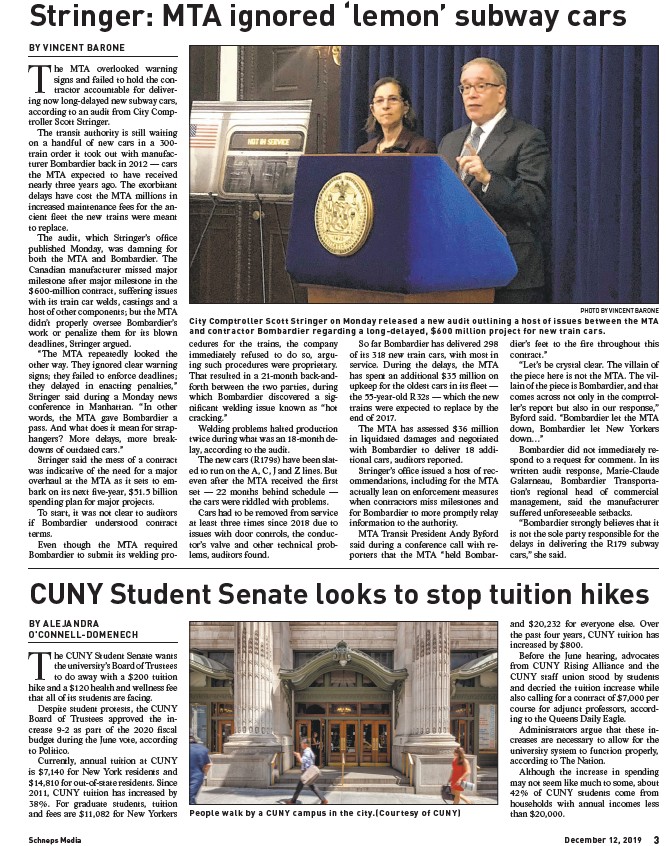
Stringer: MTA ignored ‘lemon’ subway cars
BY VINCENT BARONE
The MTA overlooked warning
signs and failed to hold the contractor
accountable for delivering
now long-delayed new subway cars,
according to an audit from City Comptroller
Scott Stringer.
The transit authority is still waiting
on a handful of new cars in a 300-
train order it took out with manufacturer
Bombardier back in 2012 — cars
the MTA expected to have received
nearly three years ago. The exorbitant
delays have cost the MTA millions in
increased maintenance fees for the ancient
fl eet the new trains were meant
to replace.
The audit, which Stringer’s offi ce
published Monday, was damning for
both the MTA and Bombardier. The
Canadian manufacturer missed major
milestone after major milestone in the
$600-million contract, suffering issues
with its train car welds, castings and a
host of other components; but the MTA
didn’t properly oversee Bombardier’s
work or penalize them for its blown
deadlines, Stringer argued.
“The MTA repeatedly looked the
other way. They ignored clear warning
signs; they failed to enforce deadlines;
they delayed in enacting penalties,”
Stringer said during a Monday news
conference in Manhattan. “In other
words, the MTA gave Bombardier a
pass. And what does it mean for straphangers?
More delays, more breakdowns
of outdated cars.”
Stringer said the mess of a contract
was indicative of the need for a major
overhaul at the MTA as it sets to embark
on its next fi ve-year, $51.5 billion
spending plan for major projects.
To start, it was not clear to auditors
if Bombardier understood contract
terms.
Even though the MTA required
Bombardier to submit its welding procedures
City Comptroller Scott Stringer on Monday released a new audit outlining a host of issues between the MTA
and contractor Bombardier regarding a long-delayed, $600 million project for new train cars.
for the trains, the company
immediately refused to do so, arguing
such procedures were proprietary.
That resulted in a 21-month back-andforth
between the two parties, during
which Bombardier discovered a signifi
cant welding issue known as “hot
cracking.”
Welding problems halted production
twice during what was an 18-month delay,
according to the audit.
The new cars (R179s) have been slated
to run on the A, C, J and Z lines. But
even after the MTA received the fi rst
set — 22 months behind schedule —
the cars were riddled with problems.
Cars had to be removed from service
at least three times since 2018 due to
issues with door controls, the conductor’s
valve and other technical problems,
auditors found.
So far Bombardier has delivered 298
of its 318 new train cars, with most in
service. During the delays, the MTA
has spent an additional $35 million on
upkeep for the oldest cars in its fl eet —
the 55-year-old R32s — which the new
trains were expected to replace by the
end of 2017.
The MTA has assessed $36 million
in liquidated damages and negotiated
with Bombardier to deliver 18 additional
cars, auditors reported.
Stringer’s offi ce issued a host of recommendations,
including for the MTA
actually lean on enforcement measures
when contractors miss milestones and
for Bombardier to more promptly relay
information to the authority.
MTA Transit President Andy Byford
said during a conference call with reporters
that the MTA “held Bombardier’s
PHOTO BY VINCENT BARONE
feet to the fi re throughout this
contract.”
“Let’s be crystal clear. The villain of
the piece here is not the MTA. The villain
of the piece is Bombardier, and that
comes across not only in the comptroller’s
report but also in our response,”
Byford said. “Bombardier let the MTA
down, Bombardier let New Yorkers
down…”
Bombardier did not immediately respond
to a request for comment. In its
written audit response, Marie-Claude
Galarneau, Bombardier Transportation’s
regional head of commercial
management, said the manufacturer
suffered unforeseeable setbacks.
“Bombardier strongly believes that it
is not the sole party responsible for the
delays in delivering the R179 subway
cars,” she said.
CUNY Student Senate looks to stop tuition hikes
BY ALEJANDRA
O'CONNELL-DOMENECH
The CUNY Student Senate wants
the university’s Board of Trustees
to do away with a $200 tuition
hike and a $120 health and wellness fee
that all of its students are facing.
Despite student protests, the CUNY
Board of Trustees approved the increase
9-2 as part of the 2020 fi scal
budget during the June vote, according
to Politico.
Currently, annual tuition at CUNY
is $7,140 for New York residents and
$14,810 for out-of-state residents. Since
2011, CUNY tuition has increased by
38%. For graduate students, tuition
and fees are $11,082 for New Yorkers
and $20,232 for everyone else. Over
the past four years, CUNY tuition has
increased by $800.
Before the June hearing, advocates
from CUNY Rising Alliance and the
CUNY staff union stood by students
and decried the tuition increase while
also calling for a contract of $7,000 per
course for adjunct professors, according
to the Queens Daily Eagle.
Administrators argue that these increases
are necessary to allow for the
university system to function properly,
according to The Nation.
Although the increase in spending
may not seem like much to some, about
42% of CUNY students come from
households with annual incomes less
People walk by a CUNY campus in the city.(Courtesy of CUNY) than $20,000.
Schneps Media December 12, 2019 3